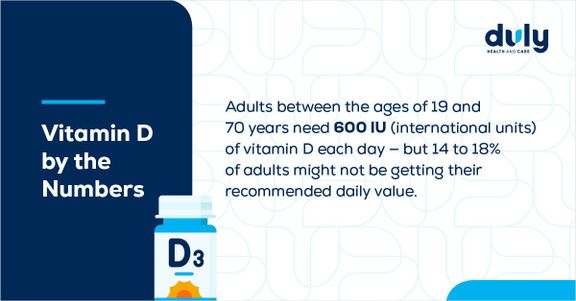When winter comes around, you might prepare by dressing in warmer clothes, stocking up on firewood, or getting your shovel out of the back of the garage.
These small steps can help you tackle the cold winter months, but they shouldn’t be the only precautions you take — especially when it comes to your health.
During the coldest period of the year, you are at greater risk for different winter injuries, and health conditions than at other times during the year. One aspect of your health you may want to take into consideration is how much vitamin D you’re getting.

As the days get shorter and the temperatures get colder — does your vitamin D level get lower like many people say it does?
Here’s that answer and more to some of the vitamin D questions you have but have never gotten a chance to ask.
1. What Does Vitamin D Do?
You may have heard the words “vitamin D” but not know much about it. You know you need it, and you know it’s good for you, but you may not totally understand what it is or how it works.
In general, vitamins are a necessary part of your body’s ability to function and stay healthy. Vitamins help your body’s cells grow, develop, and function every day. There are 13 vitamins that are considered essential, and vitamin D is one of them.
Vitamin D is a fat-soluble vitamin, meaning that in excess it can be stored in your muscles, liver, or fatty tissue. Vitamin D helps your body absorb calcium, which is needed for healthy bones. A lack of vitamin D can lead to health issues like osteoporosis in older adults or rickets in young children.
2. How Do You Get Vitamin D?
There are two main ways you get vitamin D naturally each day: in the foods you eat and through your skin, like being out in the sun.
When it comes to a vitamin like vitamin C you might know exactly what kinds of food and drink can help you get it. But vitamin D can be more confusing.
You can get vitamin D in foods and drinks like:
- Cheese
- Egg yolks
- Salmon, mackerel, tuna, and other saltwater fish
- Mushrooms
- Cereals and milk which have vitamin D added to them
You can also get vitamin D through supplements that you can take each day, depending on your needs. Your primary care provider can help you better understand whether a vitamin D supplement is a good choice for you. Just like you might take a daily vitamin, you can take a specific supplement just for vitamin D.
Your primary care provider can keep track of your vitamin D levels through routine blood tests — that’s why it’s so important to make and keep your appointment for your annual wellness exam. Schedule yours today.
3. Do You Really Need More Vitamin D in the Winter?
When it comes to vitamin D and the long winter months, here’s the real question most people want answered: Do you need to take a vitamin D supplement during the winter?
It’s true that you might be at a higher risk for vitamin D deficiency if you spend a lot of time indoors or live in a place where there is less sunshine. And it’s also true that your vitamin D levels can drop throughout the winter months. One study showed that your vitamin D levels are highest in September and lowest in March.
With this in mind, winter can and does bring lower levels of vitamin D for some people — but it’s different from person to person. Many factors, in addition to how much sunlight you get, can impact your vitamin D levels, like your diet. Some people are at a higher risk for vitamin D deficiency, and winter can increase this risk for those individuals.
4. Who Is at Risk for Vitamin D Deficiency?
You are at a higher risk for vitamin D deficiency if you:
- Have a darker skin tone
- Are older
- Have a chronic health condition like celiac or Crohn’s disease
- Have osteoporosis, liver disease, or kidney disease
- Are obese or have had gastric bypass surgery
- Take certain medications like anti-seizure drugs, antifungal drugs, and HIV/AIDS medicines (among others) that impact your body’s ability to utilize vitamin D
If you are at risk for vitamin D deficiency, you should talk to your Duly provider. They can give you options for different ways to supplement your vitamin D supply during the winter months (or at any time of year) such as over-the-counter or prescription strength supplements.
5. What Can I Do if I’m Not Getting Enough Vitamin D?
Not getting enough vitamin D from the sun and the foods you eat can lead to negative impacts on your health — but your Duly provider can help you understand your numbers and take the next steps to better health.
If you are curious about your vitamin D levels and their effect on your physical and mental health, talk to your primary care provider. With a simple blood test (often conducted at your annual wellness visit) your provider can see if you need more vitamin D and help you take the necessary steps to boost your levels.
Health Topics:








